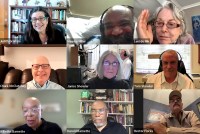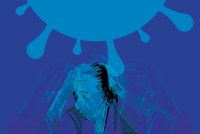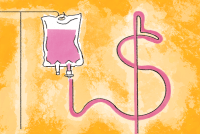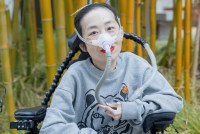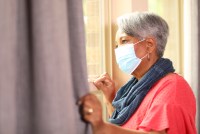Latest KFF Health News Stories
More Black Americans Are Buying Guns. Is It Driving Up Black Suicide Rates?
Gun buying among African Americans has soared in recent years. So have suicide rates among young Black men. Suicide prevention and gun safety efforts need to address race and cultural differences, Black gun owners say.
KHN’s ‘What the Health?’: A Health-Heavy State of the Union
President Joe Biden spent a large portion of his first State of the Union address talking about foreign affairs, but he also spent time on an array of health topics, including mental health, nursing home regulation, and toxic burn pits. Also this week, the administration unveiled a strategy to address the covid pandemic going forward. Alice Miranda Ollstein of Politico, Amy Goldstein of The Washington Post, and Sarah Karlin-Smith of the Pink Sheet join KHN’s Julie Rovner to discuss these issues and more. Plus, for extra credit, the panelists recommend their favorite health policy stories of the week they think you should read, too.
En Colorado, el dueño de un restaurante contrata a una especialista en salud mental para ayudar a sus empleados.
The Stress of Restaurant Work Is Reaching a Boiling Point. Could a Staff Therapist Help?
A Denver restaurant chain has a novel approach to address employees’ stress. It has hired a full-time mental health professional to help with group and one-on-one counseling.
Watch: Seniors Share How They’ve Made It Through the Pandemic
Nine seniors from across the country talk frankly about feeling alone and constrained, missing church, and family routines. They also share newfound hope and discoveries that arose from the crisis.
Targeted by Politicians, Trans Youth Struggle With Growing Fear and Mental Health Concerns
Transgender young people and their parents have stepped up to testify against legislation targeting them. But as rhetoric escalates in the political fray, what does the anti-trans legislative push mean for their mental health?
As Covid Slogs On, Seniors Find Fortitude Waning and Malaise Growing
The spread of the omicron variant has dashed the hopes of many older adults that the country was exiting the worst of the pandemic, leaving them anxious while their patience wears thin.
‘I Just Want to Stay in One Spot’: From Homeless to Housed in Rugged Del Norte
California’s homeless crisis is often understood through cities like Los Angeles and San Francisco, where the sheer number of people living unsheltered can quickly capsize the programs designed to help them. But in remote counties like Del Norte, California’s Project Homekey is having a tangible impact.
KHN’s ‘What the Health?’: It’s Health Costs, Stupid (2022 Edition)
As the pandemic wanes, for now, the ever-rising cost of health care is again taking center stage. Meanwhile, a year into the Biden administration, the FDA finally has a Senate-confirmed commissioner, Dr. Robert Califf. Tami Luhby of CNN, Sarah Karlin-Smith of the Pink Sheet, and Rachel Cohrs of Stat join KHN’s Julie Rovner to discuss these issues and more. Also this week, Rovner interviews Hannah Wesolowski of the National Alliance on Mental Illness, about how the pandemic has worsened the nation’s mental health crisis and what can be done about it.
Inside the Tactical Tug of War Over the Controversial Alzheimer’s Drug
An epic battle is playing out behind the scenes over whether the government should pay for Aduhelm, an FDA-approved Alzheimer’s drug that scientists say has not been proven to work.
This Doctor Thought She Could Navigate US Health Care. Then Her Autistic Son Needed Help.
Dr. Mai Pham left her corporate career to spark change in a system that is failing millions of Americans with autism and other intellectual and developmental disabilities.
¿Listo para otra enfermedad pandémica? Se llama “fatiga por tomar decisiones”
Antes, ir a un restaurant o visitar a los abuelos era una decisión simple pero ahora puede significar la vida o la muerte. Un experto explica esta afección pandémica.
Ready for Another Pandemic Malady? It’s Called ‘Decision Fatigue’
Pandemic living has come with a barrage of daily choices that have many of us complaining of a sort of brain freeze. That exhaustion is real, and it’s got a name: “decision fatigue.”
A Disabled Activist Speaks Out About Feeling ‘Disposable’
Alice Wong, a writer and organizer in San Francisco, says the isolation and loss of the pandemic have shown society what it’s like to be disabled.
KHN’s ‘What the Health?’: Paging the HHS Secretary
Health and Human Services Secretary Xavier Becerra is drawing criticism for his hands-off handling of the covid crisis even though the heads of the Centers for Disease Control and Prevention, National Institutes of Health, and FDA report to him. Meanwhile, the Department of Labor looks to enforce mental health “parity laws” that have failed to achieve their goals. Margot Sanger-Katz of The New York Times, Alice Miranda Ollstein of Politico, and Rachel Cohrs of Stat join KHN’s Julie Rovner to discuss these issues and more. Also this week, Rovner interviews KHN’s Noam N. Levey, who reported and wrote the latest KHN-NPR “Bill of the Month” episode about a large emergency room bill for a small amount of medical care.
Mental Health Therapists Seek Exemption From Part of Law to Ban Surprise Billing
Some practitioners object to the way upfront cost estimates are designed, saying they could affect access to care and are burdensome. Other experts disagree.
Universidades no consiguen terapeutas para el creciente número de estudiantes en crisis
En medio de la escasez nacional de estos profesionales, compiten con los sistemas hospitalarios, las consultas privadas y la floreciente industria de la telesalud para contratar y retener a los consejeros.
Colleges Struggle to Recruit Therapists for Students in Crisis
The need for mental health services on campus, which was already rising, has skyrocketed during the pandemic, with many students undergoing grave psychological crises. Colleges say they often lack the means to offer competitive salaries to therapists.
In California Nursing Homes, Omicron Is Bad, but So Is the Isolation
Omicron infections are surging in residential care facilities, causing massive sickouts among staff members and an uptick in hospitalizations and deaths. The latest visitor restrictions and testing requirements are also compounding the isolation that residents have suffered for almost two years.
Georgia Bill Aims to Limit Profits of Medicaid Managed-Care Companies
Georgia lawmakers unveiled a mental health bill that would limit the profits of the managed-care companies that serve Medicaid patients. KHN previously reported that Georgia, unlike most states, does not set a medical loss ratio for the companies’ spending on medical care and quality improvements.






